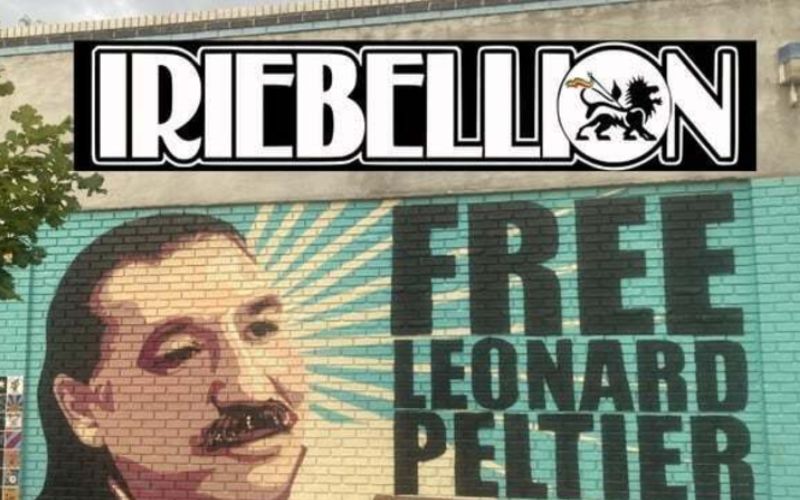
- Details
- By Native News Online Staff
Six-piece reggae band IrieBellion, based in Taos, New Mexico, has released a new single to advocate for the release of Leonard Peltier, a Native American activist who has been imprisoned for nearly 50 years.
“Leonard Peltier’s Song” features Grammy-winning flutist Robert Mirabal of Taos Pueblo and a traditional drum group composed of singers from several Indigenous nations. Through this collaboration, the band hopes to amplify calls for President Joe Biden to grant clemency to Peltier.
The song blends IrieBellion’s reggae-inspired rhythms with Robert Mirabal’s signature flute playing and the traditional Indigenous drumming and singing of John Swiftbird (Lakota), Chaske Pacheco (Dakota/Santa Domingo Pueblo), and Bryson Sanchez (Dakota/San Felipe Pueblo).
The song makes a direct plea for justice, with Davis crafting a chorus —"Do the right thing, let freedom ring/ It's been so long, let's right this wrong" — that appeals to President Biden to take action and right what the band views as a longstanding wrong.
The musical advocacy for Peltier's case has a rich history in popular music. Robbie Robertson (Mohawk), the legendary guitarist and songwriter of The Band, created a particularly powerful statement with his song "Sacrifice," which incorporated Peltier's own voice through a recorded prison phone call with Robertson. Little Steven (Steven Van Zandt), known for both his work with Bruce Springsteen's E Street Band and his solo career, also contributed to this musical legacy with his own "Leonard Peltier," which, like IrieBellion's new release, used Caribbean rhythms to carry its message of justice.
Peltier, a member of the Turtle Mountain Band of Chippewa Indians, became involved in the American Indian Movement (AIM) in the 1970s, a time of tension between Indigneous communities and the U.S. government.
AIM advocated addressing issues such as police brutality, treaty violations, and systemic inequality affecting Native Americans.
Peltier’s case comes from a 1975 shootout on the Pine Ridge Reservation in South Dakota, where two FBI agents and a young Native man were killed. The shootout occurred during a period of violence on the reservation, often referred to as the “Reign of Terror,” when residents faced threats and attacks for their ties to AIM.
Peltier was convicted in 1977 of killing the agents, but his trial has been widely criticized. Key evidence was withheld by the prosecution, including ballistics reports that could have supported his defense.
Eyewitness testimony used to extradite Peltier from Canada was later recanted, with the witness stating they were coerced by the FBI. Even the U.S. attorney who handled the case has since admitted that no one knows who fired the fatal shots.
Peltier has maintained his innocence for nearly five decades, and his case has been condemned by numerous human rights organizations, including Amnesty International. Calls for his release have grown in recent years, with Peltier now in his late seventies and facing health challenges.
“Leonard Peltier’s Song” is available on streaming platforms, including Spotify and Apple Music, and can also be found on IrieBellion’s HearNow page. The band encourages listeners to not only enjoy the song but also take action by learning about Peltier’s case, signing petitions, and contacting officials to advocate for his release.
For those who want to learn more, organizations such as the International Leonard Peltier Defense Committee provide resources and updates on efforts to secure his freedom.
More Stories Like This
From Dishwasher to Award-Winning Chef: Laguna Pueblo's Josh Aragon Serves Up Albuquerque's Best Green Chile StewRob Reiner's Final Work as Producer Appears to Address MMIP Crisis
Vision Maker Media Honors MacDonald Siblings With 2025 Frank Blythe Award
First Tribally Owned Gallery in Tulsa Debuts ‘Mvskokvlke: Road of Strength’
Zuni Youth Enrichment Project and Partners at Ho’n A:wan Productions Launch 8th Annual Delapna:we Project
Help us defend tribal sovereignty.
At Native News Online, our mission is rooted in telling the stories that strengthen sovereignty and uplift Indigenous voices — not just at year’s end, but every single day.
Because of your generosity last year, we were able to keep our reporters on the ground in tribal communities, at national gatherings and in the halls of Congress — covering the issues that matter most to Indian Country: sovereignty, culture, education, health and economic opportunity.
That support sustained us through a tough year in 2025. Now, as we look to the year ahead, we need your help right now to ensure warrior journalism remains strong — reporting that defends tribal sovereignty, amplifies Native truth, and holds power accountable.
 The stakes couldn't be higher. Your support keeps Native voices heard, Native stories told and Native sovereignty defended.
The stakes couldn't be higher. Your support keeps Native voices heard, Native stories told and Native sovereignty defended.
Stand with Warrior Journalism today.
Levi Rickert (Potawatomi), Editor & Publisher


